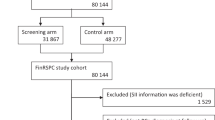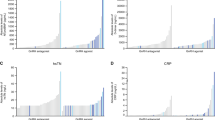Abstract
Background
Androgen deprivation therapy (ADT) has been a mainstay of treatment for advanced prostate cancer (PCa), but limited studies have been performed to investigate the association between ADT and autoimmune diseases.
Methods
We conducted a population-based nationwide cohort study of 17,168 patients newly diagnosed with PCa between 1996 and 2013 using the National Health Insurance Research Database (NHIRD) of Taiwan. Cox proportional hazards models with 1:1 propensity score-matched analysis were used to investigate the association between ADT use and the risk of autoimmune diseases. The autoimmune diseases included Graves’ disease, Crohn’s disease, psoriasis, systemic lupus erythematosus, rheumatoid arthritis, ankylosing spondylitis, Guillain-Barre syndrome, Sjogren’s syndrome, myasthenia gravis, pernicious anemia, hereditary hemolytic anemia, polyarteritis nodosa, Celiac disease, uveitis, polymyalgia rheumatica, dermatomyositis, Hashimoto’s thyroiditis, hypersensitivity vasculitis, Behcet’s disease, polymyositis, alopecia areata, Wegener’s granulomatosis, ulcerative colitis, autoimmune hemolytic anemia, pemphigus, multiple sclerosis, systemic sclerosis, Goodpasture syndrome, giant cell arteritis, thromboangitis obliterans, arteritis obliterans, and Kawasaki disease. The duration of ADT use as a time-dependent variable was also examined for its association with autoimmune diseases. We also performed six secondary analyses.
Results
Of the 17,168 selected PCa patients, 14,444 patients met all the inclusion and exclusion criteria. After propensity score matching, 5590 ADT users and 5590 non-ADT users were included in the study cohort. A propensity score-matched analysis (adjusted hazard ratio (aHR), 0.619, 95% confidence interval (CI), 0.51–0.75, P < 0.001) demonstrated a significantly decreased risk of autoimmune diseases in ADT users. A significant decrease in the risk of autoimmune diseases with increasing ADT duration was also demonstrated (P < 0.001).
Conclusions
We observed that ADT use in patients with PCa was associated with a decreased risk of autoimmune diseases. These novel findings provide a potential role for androgen deprivation therapy in the modification of inflammation and autoimmunity in Asian patients with prostate cancer.
This is a preview of subscription content, access via your institution
Access options
Subscribe to this journal
Receive 4 print issues and online access
$259.00 per year
only $64.75 per issue
Buy this article
- Purchase on Springer Link
- Instant access to full article PDF
Prices may be subject to local taxes which are calculated during checkout

Similar content being viewed by others
References
Siegel RL, Miller KD, Jemal A. Cancer statistics, 2016. CA Cancer J Clin. 2016;66:7–30.
Huggins C, Hodges CV. Studies on prostatic cancer. I. The effect of castration, of estrogen and androgen injection on serum phosphatases in metastatic carcinoma of the prostate. CA Cancer J Clin. 1972;22:232–40.
Cancer Registry Annual Report, 2000–2011. Taiwan: Department of Health, the Executive Yuan, Republic of China; 2003–13.
Shahani S, Braga-Basaria M, Basaria S. Androgen deprivation therapy in prostate cancer and metabolic risk for atherosclerosis. J Clin Endocrinol Metab. 2008;93:2042–9.
Fijak M, Meinhardt A. The testis in immune privilege. Immunol Rev. 2006;213:66–81.
Aragon-Ching JB, Williams KM, Gulley JL. Impact of androgen-deprivation therapy on the immune system: implications for combination therapy of prostate cancer. Front Biosci. 2007;12:4957–71.
Keating NL, O’Malley AJ, Smith MR. Diabetes and cardiovascular disease during androgen deprivation therapy for prostate cancer. J Clin Oncol. 2006;24:4448–56.
Nead KT, Gaskin G, Chester C, et al. Androgen deprivation therapy and future Alzheimer’s disease risk. J Clin Oncol. 2016;34:566–71.
Klil-Drori AJ, Tascilar K, Yin H, Aprikian A, Bitton A, Azoulay L. Androgen deprivation therapy and the incidence of inflammatory bowel disease in patients with prostate cancer. Am J Epidemiol. 2016;184:15–22.
Kaczmarek P, Pokoca L, Niemirowicz J, Majewska E, Baj Z. Effect of luteinizing hormone-releasing hormone (LHRH) analogue treatment on a cytokine profile in prostate cancer patients. Pharmacol Rep. 2008;60:399–403.
Salman H, Bergman M, Blumberger N, Djaldetti M, Bessler H. Do androgen deprivation drugs affect the immune cross-talk between mononuclear and prostate cancer cells? Biomed Pharmacother. 2014;68:21–24.
Bureau of National Health Insurance DoH, Executive Yuan. The National Health Insurance Statistics. 2013. http://www.nhi.gov.tw/English/webdata/webdata.aspx?menu=11&menu_id=296&webdata_id=1942&WD_ID=296. Accessed 18 Sep 2014.
Wu CY, Chen YJ, Ho HJ, Hsu YC, Kuo KN, Wu MS, et al. Association between nucleoside analogues and risk of hepatitis B virus-related hepatocellular carcinoma recurrence following liver resection. JAMA. 2012;308:1906–14.
Liu JM, Chen TH, Chuang HC, Wu CT, Hsu RJ. Statin reduces the risk of dementia in diabetic patients receiving androgen deprivation therapy for prostate cancer. Prostate Cancer Prostatic Dis. 2018. https://doi.org/10.1038/s41391-018-0091-4. [Epub ahead of print]
Chen SJ, Chao YL, Chen CY, Chang CM, Wu EC, Wu CS, et al. Prevalence of autoimmune diseases in in-patients with schizophrenia: nationwide population-based study. Br J Psychiatry. 2012;200:374–80.
Liu JM, Lin PH, Hsu RJ, Chang YH, Cheng KC, Pang ST, et al. Complementary traditional Chinese medicine therapy improves survival in patients with metastatic prostate cancer. Medicine (Baltimore). 2016;95:e4475.
Fine JP, Gray RJ. A proportional hazards model for the subdistribution of a competing risk. J Am Stat Assoc. 1999;94:496–509.
Frakt AB. An observational study goes where randomized clinical trials have not. JAMA. 2015;313:1091–2.
De Nunzio C, Kramer G, Marberger M, Montironi R, Nelson W, Schröder F, et al. The controversial relationship between benign prostatic hyperplasia and prostate cancer: the role of inflammation. Eur Urol. 2011;60:106–17.
Nelson WG, De Marzo AM, Isaacs WB. Prostate cancer. N Engl J Med. 2003;349:366–81.
Zandman-Goddard G, Peeva E. Gender and autoimmunity. Autoimmun Rev. 2007;6:366–72.
Morse MD, McNeel DG. Prostate cancer patients on androgen deprivation therapy develop persistent changes in adaptive immune responses. Hum Immunol. 2012;71:496–504.
Saylor PJ, Kozak KR, Smith MR, Ancukiewicz MA, Efstathiou JA, Zietman AL, et al. Changes in biomarkers of inflammation and angiogenesis during androgen deprivation therapy for prostate cancer. Oncologist. 2012;17:212–9.
Nadiminty N, Lou W, Lee SO, Lin X, Trump DL, Gao AC. Stat3 activation of NF-{kappa}B p100 processing involves CBP/ p300-mediated acetylation. Proc Natl Acad Sci USA. 2006;103:7264–9.
Huang S, Pettaway CA, Uehara H, Bucana CD, Fidler IJ. Blockade of NF-kappaB activity in human prostate cancer cells is associated with suppression of angiogenesis, invasion, and metastasis. Oncogene. 2001;20:4188–97.
Guzmán-Soto I, Salinas E, Quintanar JL. Leuprolide acetate inhibits spinal cord inflammatory response in experimental autoimmune encephalomyelitis by suppressing NF-κB activation. Neuroimmunomodulation. 2016;23:33–40.
Lowes MA, Suarez-Farinas M, Krueger JG. Immunology of psoriasis. Annu Rev Immunol. 2014;32:227–55.
Lowes MA, Bowcock AM, Krueger JG. Pathogenesis and therapy of psoriasis. Nature. 2007;445:866–73.
Horai R, Caspi RR. Cytokines in autoimmune uveitis. J Interferon Cytokine Res. 2011;31:733–44.
Antonelli A, Ferrari SM, Corrado A, Di Domenicantonio A, Fallahi P. Autoimmune thyroid disorders. Autoimmun Rev. 2015;14:174–80.
Engl T, Relja B, Blumenberg C, Müller I, Ringel EM, Beecken WD, et al. Prostate tumor CXC-chemokine profile correlates with cell adhesion to endothelium and extracellular matrix. Life Sci. 2006;78:1784–93.
Murphy C, McGurk M, Pettigrew J, Santinelli A, Mazzucchelli R, Johnston PG, et al. Nonapical and cytoplasmic expression of interleukin-8, CXCR1, and CXCR2 correlates with cell proliferation and microvessel density in prostate cancer. Clin Cancer Res. 2005;11:4117–27.
Taichman RS, Cooper C, Keller ET, Pienta KJ, Taichman NS, McCauley LK. Use of the stromal cell-derived factor-1/CXCR4 pathway in prostate cancer metastasis to bone. Cancer Res. 2002;62:1832–7.
Shen H, Lentsch AB. Progressive dysregulation of transcription factors NF-kappa B and STAT1 in prostate cancer cells causes proangiogenic production of CXC chemokines. Am J Physiol Cell Physiol. 2004;286:C840–847.
Morse MD, McNeel DG. T cells localized to the androgen-deprived prostate are TH1 and TH17 biased. Prostate. 2012;72:1239–47.
Koh YT, Gray A, Higgins SA, Hubby B, Kast WM. Androgen ablation augments prostate cancer vaccine immunogenicity only when applied after immunization. Prostate. 2009;69:571–84.
Khosla S, Atkinson EJ, Dunstan CR, O’Fallon WM. Effect of estrogen versus testosterone on circulating osteoprotegerin and other cytokine levels in normal elderly men. J Clin Endocrinol Metab. 2002;87:1550–4.
Yang DD, Krasnova A, Nead KT, Choueiri TK, Hu JC, Hoffman KE, et al. Androgen deprivation therapy and risk of rheumatoid arthritis in patients with localized prostate cancer. Ann Oncol. 2018;29:386–91.
Kili-Drori A, Tascilar K, Yin H, Aprikian AG, Azoulay L. Androgen deprivation therapy and the incidence of autoimmune diseases. J Clin Oncol. 2015;33:e16010.
Silman AJ, Pearson JE. Epidemiology and genetics of rheumatoid arthritis. Arthritis Res. 2002;4:S265–272.
Carlé A, Pedersen IB, Knudsen N, Perrild H, Ovesen L, Rasmussen LB, et al. Epidemiology of subtypes of hyperthyroidism in Denmark: a population-based study. Eur J Endocrinol. 2011;164:801–9.
Teng W, Shan Z, Teng X, Guan H, Li Y, Teng D, et al. Effect of iodine intake on thyroid diseases in China. N Engl J Med. 2006;354:2783–93.
Bell LM, Sedlack R, Beard CM, Perry CO, Michet CJ, Kurland LT. Incidence of psoriasis in Rochester, Minn, 1980−1983. Arch Dermatol. 1991;127:1184–7.
Donker GA, Foets M, Spreeuwenberg P, van der Werf GT. Management of psoriasis in general practice now more in agreement with the guidelines of the Dutch College of General Practitioners (NHG). Ned Tijdschr Geneeskd. 1998;142:1379–83.
Gritz DC, Wong IG. Incidence and prevalence of uveitis in Northern California; the Northern California Epidemiology of Uveitis Study. Ophthalmology. 2004;111:491–500.
Hwang DK, Chou YJ, Pu CY, Chou P. Epidemiology of uveitis among the Chinese population in Taiwan: a population-based study. Ophthalmology. 2012;119:2371–6.
Acknowledgements
This study was supported by the Taoyuan General Hospital, Ministry of Health and Welfare (Grants No. 10602), the Tri-Service General Hospital (Grants No.TSGH-C105-168 and TSGH-C108-046), and the Ministry of Science and Technology Taiwan (Grants No. MOST 104-2320-B-016-012-MY3).
Author information
Authors and Affiliations
Corresponding author
Ethics declarations
Conflict of interest
The authors declare that they have no conflict of interest.
Additional information
Publisher’s note: Springer Nature remains neutral with regard to jurisdictional claims in published maps and institutional affiliations.
Rights and permissions
About this article
Cite this article
Liu, JM., Yu, CP., Chuang, HC. et al. Androgen deprivation therapy for prostate cancer and the risk of autoimmune diseases. Prostate Cancer Prostatic Dis 22, 475–482 (2019). https://doi.org/10.1038/s41391-019-0130-9
Received:
Revised:
Accepted:
Published:
Issue Date:
DOI: https://doi.org/10.1038/s41391-019-0130-9
This article is cited by
-
Triggers for the onset and recurrence of psoriasis: a review and update
Cell Communication and Signaling (2024)
-
ZRSR2 overexpression is a frequent and early event in castration-resistant prostate cancer development
Prostate Cancer and Prostatic Diseases (2021)
-
Second-line Hormonal Therapy for the Management of Metastatic Castration-resistant Prostate Cancer: a Real-World Data Study Using a Claims Database
Scientific Reports (2020)
-
Prostate Cancer and Prostatic Diseases Best of Asia, 2019: challenges and opportunities
Prostate Cancer and Prostatic Diseases (2020)
-
Androgen Deprivation Therapy for Prostate Cancer and the Risk of Rheumatoid Arthritis: A Population-Based Cohort Study
Drug Safety (2019)



